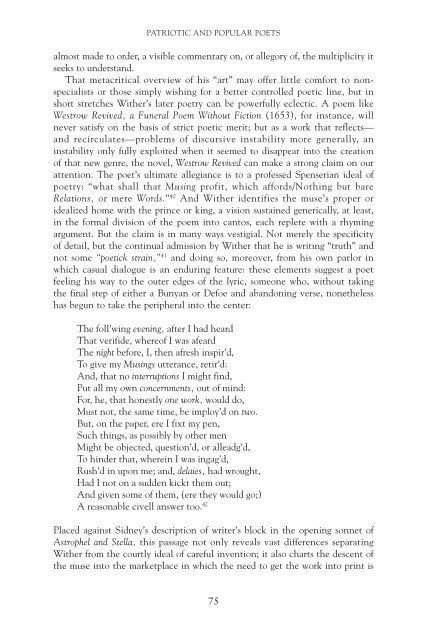ENG LYRIC POETRY.pdf - STIBA Malang
ENG LYRIC POETRY.pdf - STIBA Malang
ENG LYRIC POETRY.pdf - STIBA Malang
Create successful ePaper yourself
Turn your PDF publications into a flip-book with our unique Google optimized e-Paper software.
PATRIOTIC AND POPULAR POETS<br />
almost made to order, a visible commentary on, or allegory of, the multiplicity it<br />
seeks to understand.<br />
That metacritical overview of his “art” may offer little comfort to nonspecialists<br />
or those simply wishing for a better controlled poetic line, but in<br />
short stretches Wither’s later poetry can be powerfully eclectic. A poem like<br />
Westrow Revived, a Funeral Poem Without Fiction (1653), for instance, will<br />
never satisfy on the basis of strict poetic merit; but as a work that reflects—<br />
and recirculates—problems of discursive instability more generally, an<br />
instability only fully exploited when it seemed to disappear into the creation<br />
of that new genre, the novel, Westrow Revived can make a strong claim on our<br />
attention. The poet’s ultimate allegiance is to a professed Spenserian ideal of<br />
poetry: “what shall that Musing profit, which affords/Nothing but bare<br />
Relations, or mere Words.” 40 And Wither identifies the muse’s proper or<br />
idealized home with the prince or king, a vision sustained generically, at least,<br />
in the formal division of the poem into cantos, each replete with a rhyming<br />
argument. But the claim is in many ways vestigial. Not merely the specificity<br />
of detail, but the continual admission by Wither that he is writing “truth” and<br />
not some “poetick strain,” 41 and doing so, moreover, from his own parlor in<br />
which casual dialogue is an enduring feature: these elements suggest a poet<br />
feeling his way to the outer edges of the lyric, someone who, without taking<br />
the final step of either a Bunyan or Defoe and abandoning verse, nonetheless<br />
has begun to take the peripheral into the center:<br />
The foll’wing evening, after I had heard<br />
That verifide, whereof I was afeard<br />
The night before, I, then afresh inspir’d,<br />
To give my Musings utterance, retir’d:<br />
And, that no interruptions I might find,<br />
Put all my own concernments, out of mind:<br />
For, he, that honestly one work, would do,<br />
Must not, the same time, be imploy’d on two.<br />
But, on the paper, ere I fixt my pen,<br />
Such things, as possibly by other men<br />
Might be objected, question’d, or alleadg’d,<br />
To hinder that, wherein I was ingag’d,<br />
Rush’d in upon me; and, delaies, had wrought,<br />
Had I not on a sudden kickt them out;<br />
And given some of them, (ere they would go;)<br />
A reasonable civell answer too. 42<br />
Placed against Sidney’s description of writer’s block in the opening sonnet of<br />
Astrophel and Stella, this passage not only reveals vast differences separating<br />
Wither from the courtly ideal of careful invention; it also charts the descent of<br />
the muse into the marketplace in which the need to get the work into print is<br />
75










